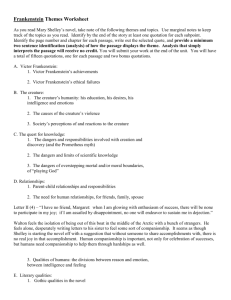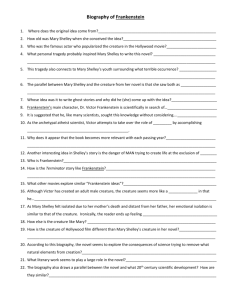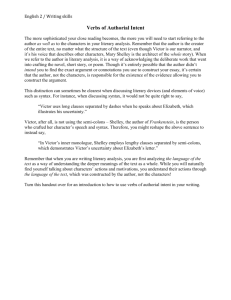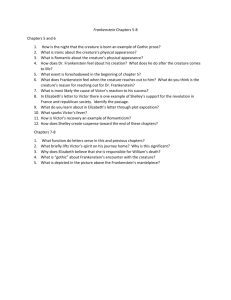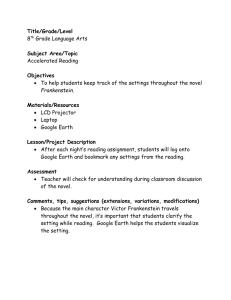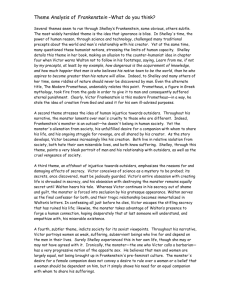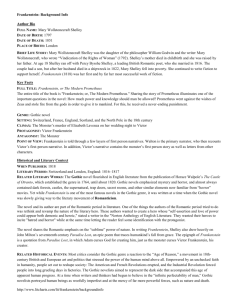Jason Moore-Frankenstein.doc
advertisement
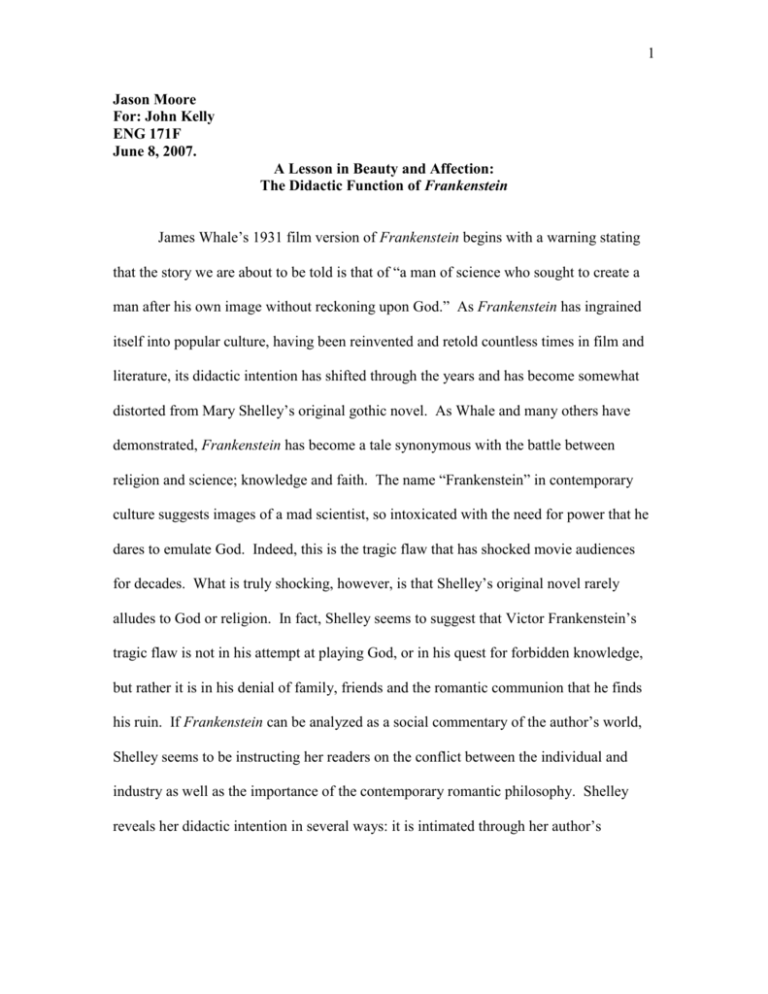
1 Jason Moore For: John Kelly ENG 171F June 8, 2007. A Lesson in Beauty and Affection: The Didactic Function of Frankenstein James Whale’s 1931 film version of Frankenstein begins with a warning stating that the story we are about to be told is that of “a man of science who sought to create a man after his own image without reckoning upon God.” As Frankenstein has ingrained itself into popular culture, having been reinvented and retold countless times in film and literature, its didactic intention has shifted through the years and has become somewhat distorted from Mary Shelley’s original gothic novel. As Whale and many others have demonstrated, Frankenstein has become a tale synonymous with the battle between religion and science; knowledge and faith. The name “Frankenstein” in contemporary culture suggests images of a mad scientist, so intoxicated with the need for power that he dares to emulate God. Indeed, this is the tragic flaw that has shocked movie audiences for decades. What is truly shocking, however, is that Shelley’s original novel rarely alludes to God or religion. In fact, Shelley seems to suggest that Victor Frankenstein’s tragic flaw is not in his attempt at playing God, or in his quest for forbidden knowledge, but rather it is in his denial of family, friends and the romantic communion that he finds his ruin. If Frankenstein can be analyzed as a social commentary of the author’s world, Shelley seems to be instructing her readers on the conflict between the individual and industry as well as the importance of the contemporary romantic philosophy. Shelley reveals her didactic intention in several ways: it is intimated through her author’s 2 introduction, directly stated through characterization and figuratively illustrated through romantic imagery. To begin, the author hints at her own values and principles through her own words. Shelley’s introduction to her own novel reveals much about the author’s state of mind before, during and after its completion. Shelley’s own words confirm a modesty that is opposite to that of her protagonist, Victor Frankenstein. She never speaks directly to any specific didactic intention of her work other than her goal to create a good, old fashioned ghost story to “curdle the blood, and quicken the beatings of the heart” (Shelley, xxiii). In fact, Shelley tells us that writing has never been a strong point for her and that her dreams and visions are much more fulfilling and original than anything she has put down on paper. Even so, this modest introduction reveals much about the author’s passions and values. Friends, family and the beauty of nature serve as Shelley’s muses and without these positive influences her masterpiece would never have been realized. These elements which make the author successful are the exact things that her protagonist negates; thereby leading to his demise. Shelley tells us that she has never been obsessed with her work, but only writes at the urging of her husband, poet Percy Bysshe Shelley: …reality stood in place of fiction. My husband, however, was from the first, very anxious that I should prove myself worthy of my parentage, and enrol myself on the page of fame. He was for ever inciting me to obtain literary reputation, which even on my own part I cared for then, though since I have become infinitely indifferent to it. (xxii) Even after the completion of a shorter, first draft of Frankenstein, it is Percy who encourages Mary to “develop the idea at greater length… but for his incitement it would never have taken the form in which it was presented to the world” (xxv). The contrast is 3 evident between the author and her protagonist. The former needs the support of her family in order to create her great work, while the latter shuns all human contact in his attempt at greatness. Furthermore, it is a love for nature and the romantic element which inspires Shelley. Her childhood spent in Scotland was filled with wonderful scenery which she says was “the aerie of freedom and the pleasant region where unheeded I could commune with the creatures of my fancy” (xxii). Victor Frankenstein shuts himself off from the outside world during his work and only later finds solace in nature. In the final words of her introduction, Shelley’s didactic intention is plainly revealed as she draws a direct parallel between herself and Victor Frankenstein. Shelley tells us that, unlike her protagonist, she has affection for her creation: …for it was the offspring of happy days, when death and grief were but words, which found no true echo in my heart. Its several pages speak of many a walk, many a drive, and many a conversation, when I was not alone; and my companion was one who, in this world, I shall never see more. (xxvi) Through this parallel Shelley is informing us that, without the presence of friends, family and the finer points of life, one’s life work is meaningless. Victor Frankenstein can never enjoy the fruits of his labour because he has no one to share it with, and nothing to guide his raw talent. Throughout the novel, characterization sustains Shelley’s sentiment exposed in her introduction: Victor Frankenstein’s tale to Walton is full of warnings as the latter seeks a similar path to greatness. Also, the personalities of Clerval and Elizabeth serve as an antithesis to Victor’s unyielding drive. As Victor reflects upon his downfall he clearly states to Walton that his negation of friends and family has lead to his demise. Having shut himself off from those who love him for two years, Victor works furiously toward his goal. Realizing Walton’s similar situation in his pursuit of a passage to the North 4 Pole, Victor lectures the explorer on his lofty ambitions even before he reveals the horror of his deeds: A human being in perfection ought always to preserve a calm and peaceful mind and never to allow passion or a transitory desire to disturb his tranquility... If the study to which you apply yourself has a tendency to weaken your affections and to destroy your taste for those simple pleasures in which no alloy can possibly mix, then that study is certainly unlawful, that is to say, not befitting the human mind. (40) These words seem to parallel Shelley’s sentiment in her introduction that one’s work must not replace one’s family. Curiously, however, Victor wavers in his instruction toward the end of his story. When Walton’s men threaten mutiny Victor chastises them and tells them that they should never give up on their goals: “Be men, or be more than men. Be steady to your purposes and firm as a rock” (191). This is a strange speech for a man who regrets his undertaking. Perhaps Shelley has added this speech for fear that her intentions may be regarded as too negative; there may be a noble quality in the attempt to pave new ways for mankind as long as the means do not obscure the end goal. Victor’s final words revert to his initial sentiment as he says, “Seek happiness in tranquility and avoid ambition” (193). Shelley not only reveals her didactic intention through Victor’s words, but also does so through the characters that he chooses to shun. Both Clerval and Elizabeth represent the moral, loving nature that Victor becomes estranged to. They represent the friends and lovers that Shelley holds dear to her heart and praises for their aid in her work. In the second chapter, Victor explains that while he is ill tempered and often violent, Clerval and Elizabeth embody the softer side of human nature: Clerval occupied himself, so to speak, with the moral relations of things. The busy stage of life, the virtues of heroes, and the actions of men were his theme.... The saintly soul of Elizabeth shone like a shrine-dedicated lamp in our peaceful home. Her sympathy was ours; her smile, her soft voice, the sweet glance of her celestial eyes, were ever there to bless and animate us. She was the living spirit of love to 5 soften and attract; I might have become sullen in my study, rough through the ardour of my nature, but that she was there to subdue me to a semblance of her own gentleness. (23- 24) The characters of Victor, Clerval and Elizabeth represent a trinity of essential traits; the ambitious academic, the moral leader and the sensitive lover. Only when Victor breaks this balanced union by shunning his friends does harmony turn to chaos. Shelley is teaching her reader that there must be a balance between these passions. When one emotion is left unchecked by the others, it may spiral out of control. Finally, Shelley’s use of romantic imagery acts as a revitalizing, comforting force throughout the novel. Nature has the power to heal the overworked, emotionally ruined Victor and it is nature alone that offers the creature friendship. Shortly after the execution of Justine, Victor is at his lowest emotional point and contemplates suicide. He decides to leave his friends and family once again, but this time it is not work that beckons him, but rather the beautiful landscape of his country. Victor describes his feelings: “The weight upon my spirit was sensibly lightened as I plunged yet deeper in the ravine of Arve. The immense mountains and precipices that overhung me on every side, the sound of the river raging among the rocks, and the dashing of the waterfalls around spoke of a power mighty as Omnipotence” (76). He goes on to describe the views and sounds of the land and their effect on his spirits; the winds’ “soothing accents” and the river’s “lullaby” (77). The influence of Percy Shelley’s romantic outlook is evident in the author’s style. It is also important to note that nature serves as Victor’s religion; no doubt another acknowledgement to the author’s husband who was a well-known atheist. In chapter twenty four, Victor kneels and kisses the earth, swearing to the night and to the “spirits” who preside over the land that he will avenge the deaths of his loved ones (180). Nature, 6 in return, blesses Victor and appears like an angel when he is most in need, to bring him food and water: “I will not doubt that it was set there by the spirits that I had invoked to aid me. Often, when all was dry, the heavens cloudless, and I was parched by thirst, a slight cloud would bedim the sky, shed the few drops that revived me, and vanish” (181). Indeed, nature and the romantic sentiment act as a benevolent force, not only for Victor but for his creature as well. While all of mankind abhors the creature, he tells Victor that, “These bleak skies I hail, for they are kinder to me than your fellow-beings” (82). Later, in chapter twelve, the creature exclaims, “Happy, happy earth! … My spirits were elevated by the enchanting appearance of nature; the past was blotted from my memory, the present was tranquil, and the future gilded by bright rays of hope and anticipations of joy" (96). Shelley’s romantic persuasion shines through her writing. The tranquility of nature that Wordsworth often speaks of (Victor even quotes from ‘Tintern Abbey’) is clearly illustrated. Neither Victor nor his creature seek refuge in God or religion, but both find comfort in the majesty of their surroundings. For a story that has become synonymous with the struggle between science and religion, the reader is challenged to find condemnation of the former and elevation of the latter in the novel. Instead Shelley champions the finer, mundane elements of everyday life. Through her own biographical sketch, her characters’ words and actions, and her use of romantic imagery, Shelley is making a moralistic statement: we must never deny friends, family and beauty in our pursuit of greatness. While Frankenstein may be regarded as the first science fiction novel, it merely uses science as a detail in a story that relates to many readers (as many sci-fi stories do). As society advances into the future 7 and becomes more sophisticated socially and scientifically, one must never take for granted the sentimental aspects of humanity; friends, family and the beauty of the mundane. 8 Works Cited Frankenstein. Dir. James Whale. Perfs. Boris Karloff, Colin Clive. Universal, 1931. Shelley, Mary. Frankenstein. New York: New American Library (Penguin), 2000.


